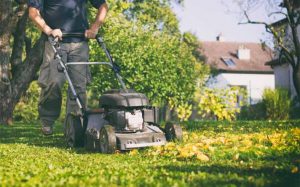3 Lawn Care Practices You Can Do Yourself
Your lawn should be the pride of your landscaping. Thick, vibrant green grass makes any outdoor space more beautiful, drives up your property values, and keeps your yard cool and comfortable. Unfortunately, you probably can’t get the lush lawn of your dreams without help.
Many homeowners believe that putting in a lawn is the easiest solution to landscaping, but keeping a lawn healthy and gorgeous isn’t easy. In fact, there are really only three lawn care activities you can safely do on your own; the rest should be outsourced to a trustworthy lawn care professional.

3 lawn DIYs
Because they occur frequently and can be completed with minimal equipment, these are the tasks you can trust yourself to do:
Watering
Thanks to hoses, sprinklers, irrigation, and rain, watering your lawn is relatively easy. Still, it is possible to mess up your lawn’s moisture. Contrary to what you might expect, your lawn doesn’t need water every day. Instead, it prefers a long, deep drink two to three days every week, totaling about one to one and a half inches. Additionally, you should water early in the morning, which allows the water to sink into the soil. As a test, you should be able to stick a six-inch screwdriver into your lawn when it is dry; that proves you are watering well.
Mowing
You shouldn’t let your grass keep growing unto eternity—then your lawn will look unkempt. However, you also don’t want to cut it back too much, which can prevent new growth, effectively killing your lawn. You should never remove more than one-third of your grass’s blade length at one time, which means you might need to set your mower to different heights depending on the season. You should try to vary your lawn mowing pattern each time you mow to encourage the blades to grow straight. Almost all other mowing tips and tricks concern lawn mower maintenance.
Weeding
Applying herbicide is tricky at the best of times; when weeds are growing close to your lawn, it is far safer to pull or cut them than to hazard damaging your grass with plant poison. However, you do have to kill weeds at the root if you don’t want them growing back within the week. The best strategy is to pull when the soil is wet – just after a drenching rain or a good watering—and to cut them with a hoe below the soil line when conditions are dry.

Everything else
It isn’t easy being green. Left to its own devices, grass isn’t very good at growing. For a truly lush lawn, you need to do more than offer your lawn water and sunshine—a lot more. Unfortunately, the tasks necessary for a lush, spotless lawn require expensive tools, expert timing, and experienced intuition, which you likely don’t have unless you are a lawn care professional. Here are the lawn-related tasks essential to keeping your lawn alive but inadvisable for the lawn layperson to complete:
Fertilizing
Fertilizers come in all sorts of combinations of nitrogen, phosphorus, potassium, and dozens of smaller additives, and each combination has a discrete purpose. Plus, you should only fertilize at specific times of year. You should outsource the difficult fertilizer decision-making to a knowledgeable professional.
Aerating
Unless you want to spend all your weekends in spring punching equidistant holes of identical diameter and depth all across your lawn, you should hire an aeration service to do that work for you. They have specialized equipment that makes loosening compacted soil incredibly easy.
Seeding
Incorrectly seeding leads to dramatic problems for the lifetime of your lawn. For example, you might seed the wrong type of grass for your lawn, or you might over-seed some regions while completely missing others. Lawn professionals know how to prepare your soil, seed, and follow up appropriately to keep your lawn lush.
Controlling pests
Chinch bugs, moles, Japanese beetles, armyworms, voles, billbugs—there are too many lawn pests to name in a single post. There are different symptoms for each type of pest, and different treatments, too. Instead of worrying about the creepy-crawlies in your yard, you should trust your lawn professionals to manage pest control.
Troubleshooting
Your lawn is turning brown. Why? You can Google until your fingers bleed, and you can’t be certain of the cause without consulting a professional. Lawn care experts can recognize the important symptoms on sight—or else they can take samples of your lawn, soil, and water to accurately diagnose the problem. Then, you can be sure to have your bright green lawn back in no time.
Article Courtesy of Land.com
3 Lawn Care Practices You Can Do Yourself

The Boehm Team | (830) 428-8106 | info@MyBoehmTeam.com
Featured Properties
Farm & Ranch Properties
